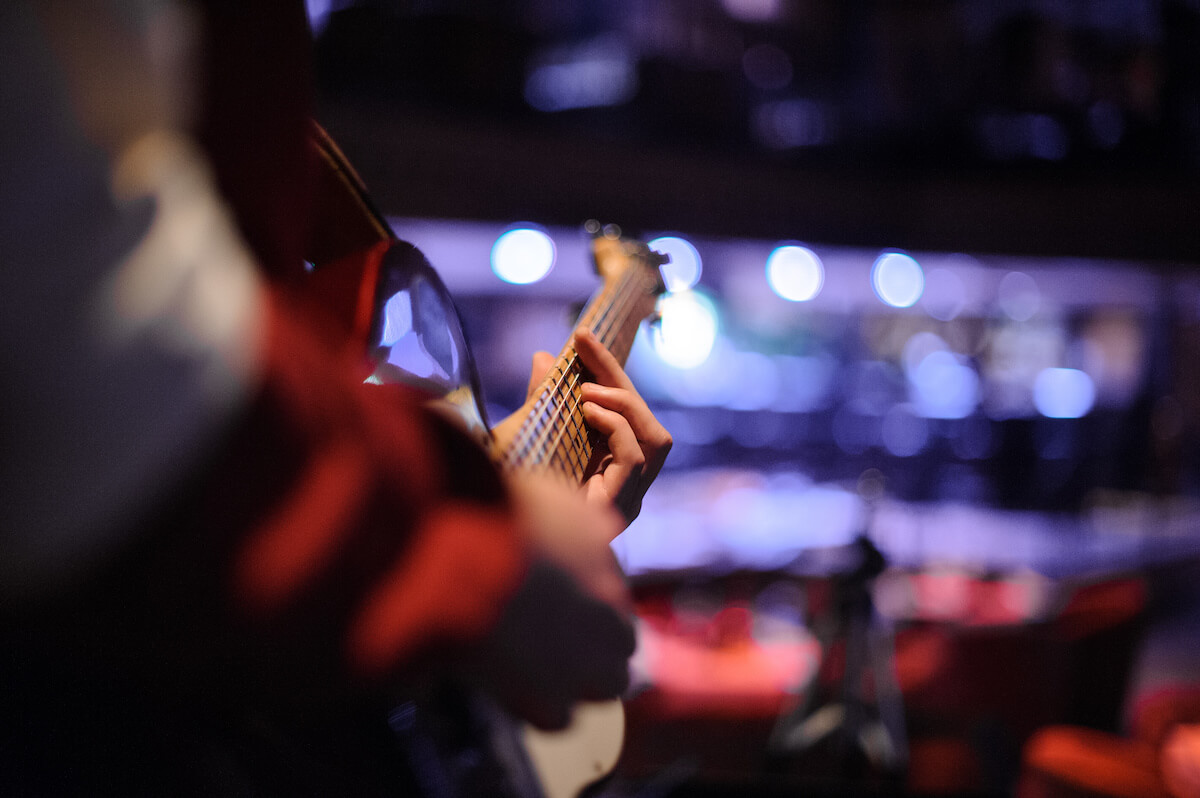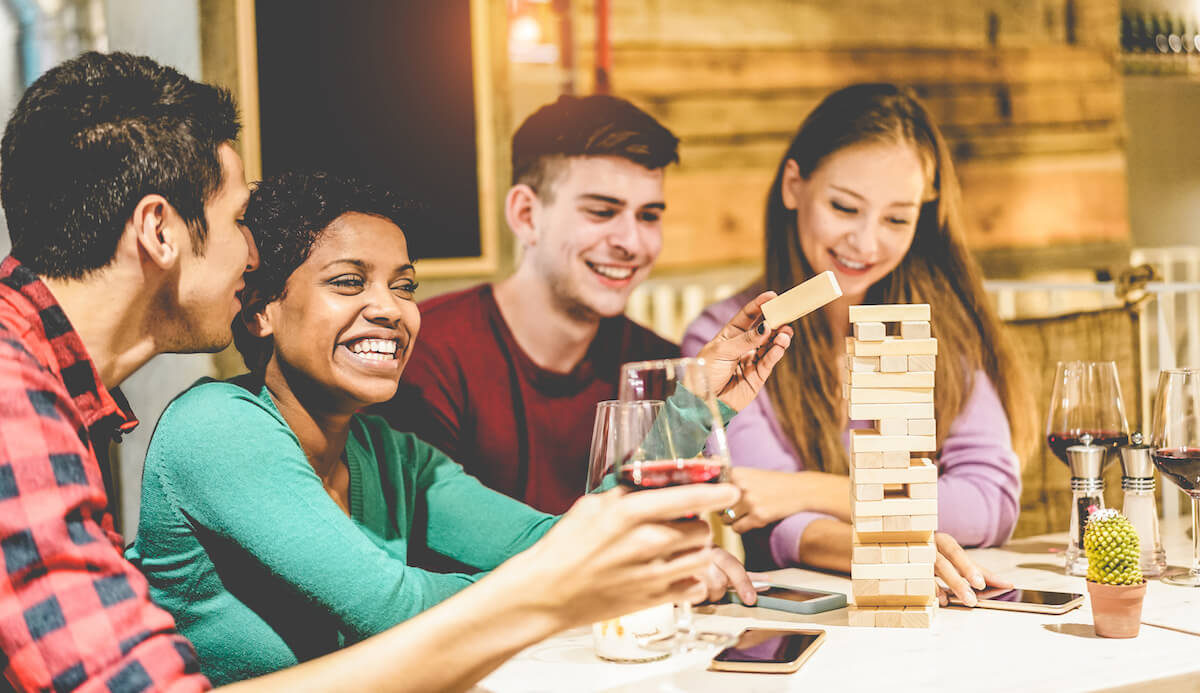Draw in new customers with restaurant entertainment
Skip the article and turn takeaways into action by scheduling a call with our team.
Enjoying and sharing great food might be all you need to have a good time. This is why traditions built around the love and appreciation of food go back to the dawn of time. However, diners often want stimulation beyond what they can find on their plates—and that’s where restaurant entertainment comes into play.
There are countless ways to enhance the dining experience with entertainment, and the restaurant business is inventing new ideas all the time. Many of these restaurant entertainment options are tried and true and can easily be adapted to your location.
Let’s check out three restaurant entertainment ideas, as well as ways you can make them suit your business.
Live entertainment

Hiring entertainers to enliven the dining experience is a classic practice. Musicians, comedians, acrobats, and more have spread cheer among the dining classes for ages, and the tradition is very much alive in restaurant entertainment.
Live music
Live music can certainly brighten an atmosphere, draw a crowd, and contribute to a good time. However, it needs to be handled carefully, as poorly managed restaurant entertainment can easily drive away customers depending on what kind of venue you operate.
A venue with plenty of room, like a sports bar, is well-suited to live music and would likely do well with a weekly cover band or similar acts like solo artists or duos. Even if you don’t have a stage, you can move tables to accommodate a band or use an outdoor space. Just keep in mind that a band can take up more room than you might imagine, especially with gear like microphones, speakers, and cables.
A chic, upscale venue could opt for a DJ for ambiance, especially during evenings and weekends. For example, BarChi Sushi in Austin featured a late happy hour for years. On Saturdays and Sundays, starting around 10pm, DJs were spinning restaurant-friendly tunes—upbeat and funky but not overly distracting.
The restaurant-friendly aspect is key here. Diners expect to be able to talk to those at their table, so both the volume and the song choice need to be relatively unobtrusive. This is a key consideration for restaurant entertainment and a big difference from bar entertainment, where a live act can be customers’ central focus.
Upscale brunch or dinner can be well-complemented by instrumental music, like a pianist or a classical quartet.
Restaurant managers need to keep a close eye on budgets and income when hiring live acts. In general, if you find your profits are smaller when there’s a live act, it might be time to shelve the idea. Musicians need to be paid, of course, but the restaurant needs to make sure the investment is worth their while.
So, while live music might seem like a no-brainer, it really isn’t. Restaurants need to carefully curate the music played and suit it to their venue, or they risk frustrating customers who are looking for a pleasant meal.
Dinner theater
If you’re in a theater-forward city like San Francisco or New York, hosting a play can be a great way to get customers in the door. It works best if you have a stage, but as long as you can clear enough space, your diners can enjoy a theatrical experience.
That may mean you lose some seating, but this type of restaurant entertainment can also be a significant draw for the theater-minded. Much depends on both the quality of the production and the interest of the crowd. However, if you know you can catch the eyes of an interested audience, dinner theater can bring in a good amount of customers.
Game night

Some healthy competition can make a decent dining experience into a memorable one—it’s a crowd-pleasing type of restaurant entertainment. Many customers look forward to their favorite game night. From darts to casino nights, there are games for all kinds of players to enjoy at your bar or restaurant. However, a few options stand out above the others.
Trivia night
For any venue that resembles a bar, a trivia night can bring in a lot of business. It can be especially valuable when it creates returning customers who play on regular teams, generating a regular flow of income.
Trivia nights (also called pub quizzes) have long been popular in pub culture in the U.K. and Commonwealth countries and have gained steam in the U.S. lately. For the uninitiated, they work like this:
- The restaurant manager hires a trivia/quizmaster who creates a quiz, usually lasting 2-3 hours.
- Customers organize themselves into teams, often paying an entrance fee. They answer a few rounds of questions, with five rounds of ten questions being fairly common.
- The winning team receives a prize—like drinks, memorabilia, cash from the winnings (depending on local laws), or credit to spend in the establishment.
When done well, trivia night can become a regular draw and help cement your reputation as a fun place.
But, like with live music, it’s all about the time and the place. Upscale restaurants or restaurants that don’t earn much from alcohol sales would likely not do well with a trivia night since customers will generally be there for a couple of hours playing the quiz. This means that table turnover will be low, and you’ll need to maximize revenue per table, which is best done with repeat orders like alcoholic beverages or snacks.
Very small venues aren’t great spots for trivia games, either. You want enough room for teams to sit in groups and for customers who are not playing the quiz to still enjoy a drink or meal, as well. As with any restaurant entertainment, the layout and design of your establishment matter.
Generally, trivia works best on weekdays since it usually finishes around 10pm and can help lift mid-week spirits for both the establishment and its customers. Since weekends generally bring busier nights, trivia likely won’t be the best restaurant entertainment on Friday or Saturday. Consider your traffic patterns to find the best days and times for your trivia games.
Board games
Board games are going through a modern renaissance, so board game nights can be big draws when done right. Like trivia night, board games can bring in regular customers and provide activities that help build community—making your restaurant a hub of connection and fun.
It’s all down to style, in the end. Since board games take up a lot of table space, traditional, sit-down restaurants are not good fits for board game nights.
However, hybrid bar-restaurants can be just right for board games. And there’s another upshot—whereas live music and trivia can dominate the atmosphere for a few hours, board games don’t interfere with the dining experience of others.
So, having a wide variety of current and popular board games, as well as classics like cards and dominoes, can provide a valuable restaurant entertainment option for an establishment that’s not 100% focused on food.
Menu variations

Mixing up your menu options can be restaurant entertainment in its own right. Seasonal menu items can revive the interest of your existing customers. Weekly BBQs, wine tastings, and new appetizers can pique the interest of prospective diners. You can also take the opportunity to try something you’ve wanted to test out for a while. Advertising these events or changes on social media can help draw a (potentially new) crowd and may lead you to add popular items to your menu permanently.
If you’re not sure about jumping into food trends, try rolling out new items in a fun event for customers by preparing a tasting menu of potential menu options. This can help you get valuable feedback from diners or bring in new customers who have not yet tried your food.
Classic entertainment options

Billiards, darts, pinball, and arcade games have long entertained customers looking for a good time out. Arcade games have especially seen an uptick in popularity over the last decade, with spots like Barcade expanding rapidly. Retro games like Pac-Man, Galaga, and Donkey Kong are classics that have stood the test of time.
If you want to add games like this to your establishment, there are two key considerations to keep in mind:
- You need to have enough space for these games to make sense.
- They only work in relaxed or bar-leaning restaurants.
Beyond that, having these options available puts you in the prized category of “places with things to do besides eat.” If you have the space and you serve alcohol, a pool table is a timeless addition. Craft beer pubs, for example, are a perfect location for this kind of entertainment since people love to have something to do while they sip a beer. Casual and fast-casual restaurants or even pizzerias can be well-served by classic games as well.
Stay up to date with Yelp
Whether you’re looking at live entertainment, game night, or classic games, adding a bit of fun to your establishment can be an excellent draw for both old customers and new ones. There are so many options for bringing restaurant entertainment to your customers, so consider your space, traffic flow, and what your customers want to find the right fit for your establishment.
And when you’re dealing with a packed house due to live music or a game night, you’ll need to keep your front-of-house (FOH) working as smoothly as possible. Having robust FOH software can take your service game to the next level. Yelp Guest Manager helps with bookings and reservations, waitlist management, table management, floor plans, and takeout/to-go orders.
Want to see how it works? Reach out to us for a free demo, and we’ll show you around. Getting into the swing of it can be pretty entertaining.